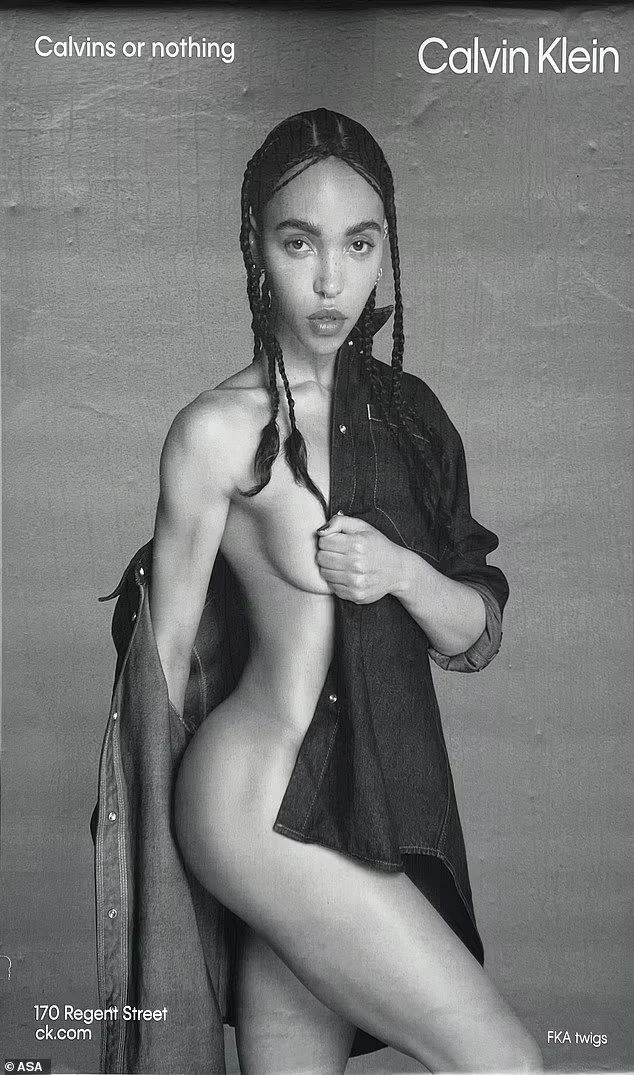Breaking Boundaries: FKA twigs’ Controversial Calvin Klein Poster Sparks Conversation on Objectification in Advertising

In the world of advertising, it is not uncommon to see provocative and controversial campaigns that aim to grab the attention of consumers. One such campaign that has recently sparked a heated discussion is FKA twigs’ Calvin Klein poster. This eye-catching advertisement featuring the acclaimed singer and dancer has ignited a conversation on the objectification of women in advertising and the power dynamics that exist within the industry.

The objectification of women in advertising is not a new phenomenon. For decades, women have been portrayed as objects of desire, their bodies used to sell products ranging from cars to fragrances. This blatant objectification perpetuates harmful stereotypes and reinforces the notion that a woman’s worth is tied to her physical appearance. While progress has been made in recent years to challenge these ideals, FKA twigs’ Calvin Klein poster serves as a reminder that there is still much work to be done.

Upon its release, FKA twigs’ Calvin Klein poster immediately caught the attention of the public. The image, which features the artist in a suggestive pose, received both praise and criticism. Supporters commended the campaign for its artistic expression and celebration of female sensuality. However, critics argued that the poster perpetuates the objectification of women and reinforces harmful beauty standards.

The public response to FKA twigs’ Calvin Klein poster was divided. Many individuals took to social media to express their opinions, with some commending the campaign for its boldness and artistic vision. Others, however, criticized the poster for its objectification of women and called for more responsible advertising practices. The controversy surrounding the poster sparked a wider conversation on the representation of women in the media and the need for greater diversity and inclusion.

Social media played a significant role in fueling the conversation around FKA twigs’ Calvin Klein poster. Platforms such as Twitter and Instagram became battlegrounds for opposing viewpoints, with users engaging in heated debates about the campaign. This digital discourse allowed for a wider range of voices to be heard and brought attention to the issue on a global scale. The power of social media in shaping public opinion and holding brands accountable cannot be underestimated.

The controversy surrounding FKA twigs’ Calvin Klein poster raises important questions about the thin line between objectification and empowerment in advertising. While some argue that the campaign celebrates female sensuality and challenges traditional beauty standards, others contend that it reinforces harmful stereotypes and perpetuates the objectification of women. The interpretation of the poster is subjective, and opinions on its message vary greatly.

Controversial advertising campaigns such as FKA twigs’ Calvin Klein poster can have a significant impact on consumer behavior. While some individuals may be drawn to the brand and its products as a result of the provocative nature of the campaign, others may choose to boycott or criticize the brand for its perceived objectification of women. The controversy surrounding the poster has the potential to shape consumer attitudes and purchasing decisions, highlighting the need for brands to be mindful of the messages they convey.

In the face of backlash, Calvin Klein issued a statement addressing the controversy surrounding FKA twigs’ poster. The brand acknowledged the diverse range of opinions and emphasized its commitment to promoting inclusivity and challenging norms. Calvin Klein stated that the campaign was intended to celebrate the strength and power of women, but recognized that the message may have been misinterpreted. The brand expressed its willingness to engage in dialogue and learn from the experience.

The controversy surrounding FKA twigs’ Calvin Klein poster serves as a wake-up call for the advertising industry as a whole. It highlights the need for greater diversity and representation in advertising campaigns and underscores the responsibility brands have in shaping cultural norms. The conversation sparked by the poster is a reminder that the industry must continue to challenge outdated ideals and work towards more inclusive and empowering advertising practices.

FKA twigs’ Calvin Klein poster has ignited a much-needed conversation on the objectification of women in advertising. It has highlighted the power of provocative campaigns to shape public opinion and has called attention to the responsibility brands have in portraying women in a respectful and empowering manner. The controversy surrounding the poster serves as a reminder that progress is not linear and that ongoing dialogue and change are necessary to create a more inclusive advertising industry. As consumers, it is crucial that we continue to hold brands accountable and demand greater representation and diversity in the media we consume.









